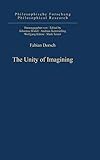The Unity of Imagining / Fabian Dorsch.
Material type: TextSeries: Philosophische Forschung / Philosophical Research ; 9Publisher: Berlin ; Boston : De Gruyter, [2013]Copyright date: ©2012Description: 1 online resource (485 p.)Content type:
TextSeries: Philosophische Forschung / Philosophical Research ; 9Publisher: Berlin ; Boston : De Gruyter, [2013]Copyright date: ©2012Description: 1 online resource (485 p.)Content type: - 9783110325195
- 9783110325966
- 100
- B105.I49
- online - DeGruyter
- Issued also in print.
| Item type | Current library | Call number | URL | Status | Notes | Barcode | |
|---|---|---|---|---|---|---|---|
 eBook
eBook
|
Biblioteca "Angelicum" Pont. Univ. S.Tommaso d'Aquino Nuvola online | online - DeGruyter (Browse shelf(Opens below)) | Online access | Not for loan (Accesso limitato) | Accesso per gli utenti autorizzati / Access for authorized users | (dgr)9783110325966 |
Browsing Biblioteca "Angelicum" Pont. Univ. S.Tommaso d'Aquino shelves, Shelving location: Nuvola online Close shelf browser (Hides shelf browser)

|

|

|

|

|

|

|
||
| online - DeGruyter Reason and Rationality / | online - DeGruyter Ontological Proofs Today / | online - DeGruyter Intersubjectivity and Objectivity in Adam Smith and Edmund Husserl : A Collection of Essays / | online - DeGruyter The Unity of Imagining / | online - DeGruyter Gustav Bergmann : Phenomenological Realism and Dialectical Ontology / | online - DeGruyter States of Affairs / | online - DeGruyter Wahrnehmung und Wirklichkeit / |
Frontmatter -- Table of Contents -- Detailed Table of Contents -- Acknowledgements -- Introduction -- Part One. The Nature and Variety of Imagining -- Introduction to Part One -- CHAPTER 1. Unified Accounts of Imagining -- CHAPTER 2. Key Features of Imaginative Episodes -- CHAPTER 3. Key Features of Sensory Imaginings -- CHAPTER 4. Imagination and Knowledge -- CHAPTER 5. Other Theories of Imagining -- Part Two. The Epistemological Account -- Introduction to Part Two -- CHAPTER 6. O’Shaughnessy’s View -- CHAPTER 7. O’Shaughnessy’s Arguments -- CHAPTER 8. Critical Assessment -- Part Three. The Dependency Account -- Introduction to Part Three -- CHAPTER 9. The Representational Account -- CHAPTER 10. Visual Imagining As Experiential Imagining -- CHAPTER 11. Emotional Imagining As Experiential Imagining -- Chapter 12. Semantic Dependency, Simulation, and Pretense -- Part Four. The Agency Account -- Introduction to Part Four -- CHAPTER 13. Imaginative Agency -- CHAPTER 14. Meeting the Desiderata -- Conclusion -- Bibliography -- Index
restricted access online access with authorization star
http://purl.org/coar/access_right/c_16ec
In this highly ambitious, wide ranging, immensely impressive and ground-breaking work Fabian Dorsch surveys just about every account of the imagination that has ever been proposed. He identifies five central types of imagining that any unifying theory must accommodate and sets himself the task of determining whether any theory of what imagining consists in covers these five paradigms. Focussing on what he takes to be the three main theories, and giving them each equal consideration, he faults the first two and embraces the third. The scholarship is immaculate, the writing crystal clear and the argumentation always powerful. Malcolm Budd, FBA, Emeritus Grote Professor of the Philosophy of Mind and Logic, University College London Excerpt Open publication
Issued also in print.
Mode of access: Internet via World Wide Web.
In English.
Description based on online resource; title from PDF title page (publisher's Web site, viewed 28. Feb 2023)


